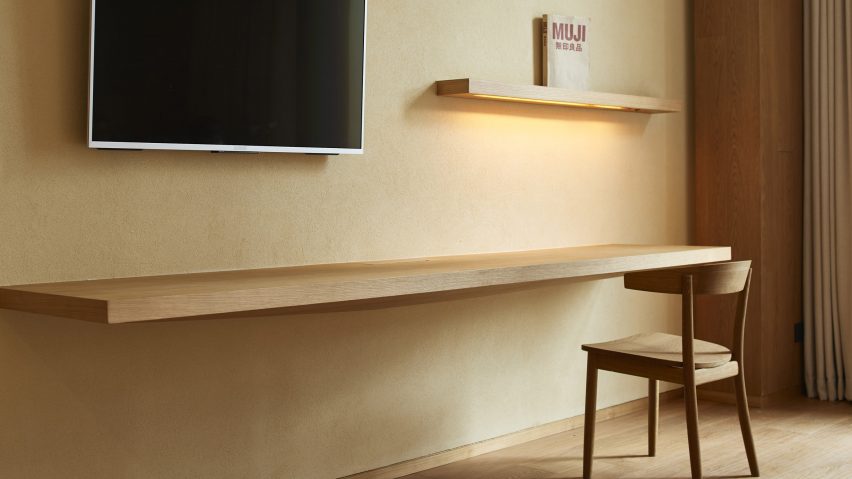Wood-lined bedrooms, a minimal diner and a shop all feature inside the Muji Hotel in Shenzhen, which is due to open to the public later this month.
The Muji Hotel, located in the city's Futian district, is the first hospitality project initiated by the Japanese retailer, which is best-known for its minimalist homeware products.
Kitted-out with its own furnishings, the hotel is intended to reflect Muji's simple aesthetic – described by the brand as an "anti-gorgeous, anti-cheap concept".
"Travel has become part of our daily lives. It has evolved from the extraordinary to the ordinary, from something in which we participate to something we create," said the brand.
"Muji Hotel provides an answer to this shift in demand. Cooperating with Muji stores, [it] seeks to provide a physical experience of the Muji philosophy through the texture of the towels, the placement of outlets and light switches, menu and venue of the restaurant, and more."
The hotel has 79 guestrooms, a gym, a diner, three meeting rooms, a library and a shop. It officially opens to the public on 18 January 2018.
In the bedrooms, wood is used to line the walls. Muji products, ranging from toothbrushes to electric kettles and wall-mounted CD players designed by Naoto Fukasawa are included for guests to use.
On the third floor, a restaurant – named Muji Diner – serves local food inspired by home cooking from around the world, all served on Muji dinnerware.
A library also on the third floor offers a selection of over 650 books. Open 24 hours a day, the facility is free to use for both the general public and hotel guests.
A small gym is equipped with running machines, aero-bikes and workout equipment, while a shop allows guests to purchase the products they have been using inside the hotel.
The Muji Hotel in Shenzhen will be followed a second outpost in Tokyo's Chūō City, which is slated for completion in 2019.
The hotels are the latest architectural project to be initiated by the Muji, following on from a compact nine-square-metre prefabricated house and a trio of huts designed by Konstantin Grcic, Jasper Morrison and Naoto Fukasawa.
In an exclusive interview with Dezeen last year, Muji art director Kenya Hara likened working for the brand to "spinning circus plates".
"Muji itself is a special existence, and it is like spinning circus plates – you have to keep moving the sticks in order for the plates to spin," he said.
Established in 1979, Muji is commonly referred to as a "brandless" company, as its products bear no logos. Its simple aesthetic, which has become synonymous with contemporary Japanese design, allows its products to fit into a variety of homes and lifestyles – one of the reasons the brand has become hugely popularity in recent years.
"A lot of people think that Muji's products are very simple, cutting out the heavy decoration and the flamboyant things," said Hara. "But minimalism and simplicity are not Muji's only features. Muji is always changing and Muji is a huge question I think. Muji is not a trend."
The brand climbed 24 places to earn the second spot on this year's Dezeen Hot List – an index of the 500 designers, architects and brands our audience most wanted to read about.

